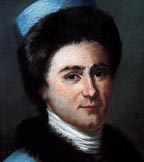
|


|
|
|
Mr. Sedivy's
More Features:
|
Highlands Ranch High School - Mr. Sedivy
- Famous Quotes Throughout
World History -
René Descartes 1596 - 1650 "Common sense is the best distributed commodity in the world, for every man is convinced that he is well supplied with it." "Cogito, ergo sum." (I think, therefore I am.) 
Thomas Hobbes 1588 - 1679 1651 - Leviathan "True and False are attributes of speech, not of things. And where speech is not, there is neither Truth nor Falsehood." "Words are wise men's counters, they do but reckon by them." "They that approve a private opinion, call it opinion; but they that mislike it, heresy: and yet heresy signifies no more than private opinion." "During the time men live without a common power to keep them all in awe, they are in that condition which is called war; and such a war as is of every man against every man." "For as the nature of foul weather, lieth not in a shower or two of rain; but in an inclination thereto of many days together: so the nature of war consisteth not in actual fighting, but in the known disposition thereto during all the time there is no assurance to the contrary." "No arts; no letters; no society; and which is worst of all, continual fear and danger of violent death; and the life of man, solitary, poor, nasty, brutish, and short." Last words: 
John Locke 1632 - 1704 1690 - Essay concerning Human Understanding "New opinions are always suspected, and usually opposed, without any other reason but because they are not already common." "No man's knowledge here can go beyond his experience." "It is one thing to show a man that he is in error, and another to put him in possession of truth." "Reason is natural revelation." "Crooked things may be as stiff and unflexible as straight: and men may be as positive in error as in truth." "All men are liable to error; and most men are, in many points, by passion or interest, under temptation to it." 1690 - Second Treatise of Civil Government "Whatsoever ... (man) removes out of the state that nature hath provided and left it in, he hath mixed his labor with, and joined to it something that is his own, and thereby makes it his property." "The end of law is, not to abolish or restrain, but to preserve and enlarge freedom." "This power to act according to discretion for the public good, without the prescription of the law, and sometimes even against it, is that which is called prerogative." Sir Isaac Newton 1642 - 1727 February 5, 1676 1687 - Principia Mathematica 1687 - Principia Mathematica 1687 - Principia Mathematica "I don't know what I may seem to the world, but as to myself, I seem to have been only like a boy playing on the sea-shore and diverting myself in now and then finding a smoother pebble or a prettier shell than ordinary, whilst the great ocean of truth lay all undiscovered before me." Philippe Néricault Destouches 1680 - 1754 "The absent are always in the wrong." 
David Hume 1711 - 1776 1739 - A Treatise upon Human Nature 1741 - 1742 - Essays: Moral and Political 1741 - 1742 - Essays: Moral and Political 1741 - 1742 - Essays: Moral and Political 1741 - 1742 - Essays: Moral and Political 1748 - Enquiry Concerning Human Understanding 1748 - Enquiry Concerning Human Understanding
Frederick the Great 1712 - 1786 March 19, 1771 - Letter to Voltaire June 18, 1757 - To hesitant Guards at Kolin His interpretation of benevolent despotism: Empress Catherine the Great 1729 - 1796 "I shall be an autocrat: that's my trade. And the good Lord will forgive me: that's his." 
Immanuel Kant 1724 -1804 1784 1785 - Fundamental Principles of the Metaphysics of Ethics 1785 - Fundamental Principles of the Metaphysics of Ethics 1788 - Critique of Practical Reason Bishop Samuel Horsley 1733 - 1806 "In this country ... the individual
subject ... has nothing to do with the laws but to obey them." -
Famous Quotes Throughout World History - | Index of Quotes by Speaker
/ Historical Period | Famous Quotes from American History
|
Highlands Ranch High School ![]() 9375 South Cresthill Lane
9375 South Cresthill Lane ![]() Highlands Ranch, Colorado 80126
Highlands Ranch, Colorado 80126 ![]() 303-471-7000
303-471-7000
Mr. Sedivy's History Classes
| Colorado History | American
Government | Advanced Placement Modern European
History | Rise of Nation State England | World
History |
World History: Dawn of Civilization
to Napoleon - Units of Study
| Prehistory | Mesopotamia
& Phoenicians | Ancient Egypt | Greece
| Rome | Medieval History
| Renaissance and Reformation | Exploration
| National Monarchies |
| The Scientific Revolution and the Enlightenment
| Colonial America and the American Revolution
| The French Revolution and the Napoleonic Era |
| Home | Back to top of page | Site Contents |



